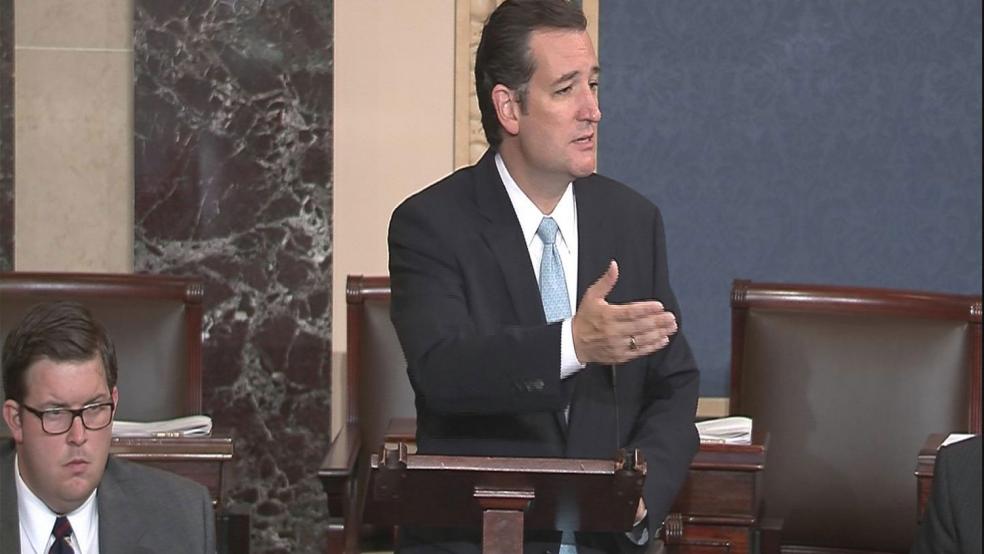With the day of reckoning upon us, Congress now appears on track to approve a bipartisan compromise today that would end the two-week old government shutdown and avert a first-ever default on U.S. debt.
After Tuesday’s political fiasco in the House in which Republicans failed to agree among themselves on the best way to end the fiscal crisis, Senate Majority Leader Harry Reid (D-NV) and Minority Leader Mitch McConnell (R-KY) today put the finishing touches on a bipartisan agreement that would break the political deadlock.
The Senate is expected to pass the compromise with dispatch, especially after Sen. Ted Cruz (R-Tex.), a Tea Party firebrand, told reporters Wednesday morning that he would not engage in delaying tactics as he did two weeks ago in helping to precipitate the government shutdown. Cruz has repeatedly urged House and Senate Republicans to hang together to try to block implementation of Obamacare and not “blink.”
Yet confronted by scores of Senate Republican colleagues who fear the political and economic consequences of a default, Cruz said today he would not stand in the way of the deal.
RELATED: CAN A SPLINTERED GOP PICK UP THE PIECES?
“I would point out that had Senate Republicans united and supported House Republicans, the outcome of this I believe would have been very, very different,” Cruz told reporters. “I wished that had happened, but it did not. But it does give a path going forward, that if the American people continue to rise up, I believe the House will continue to listen to the American people and I hope in time the Senate begins to listen to the American people.”
While Cruz was “blinking,” Reid and McConnell took to the Senate floor to hail the compromise they meticulously worked out behind closed doors during the past several days. The two putative political rivals and enemies set aside their many differences to iron out a compromise after Boehner repeatedly failed to do so in the House.
“What we have done is send a message to Americans from every one of our 50 states, and in addition to that every country in the world, that the United States lives up to its obligations,” Reid said.
"This has been a long, challenging few weeks for Congress and for the country,” McConnell said. “It's my hope that today we can put some of those most urgent issues behind us."
"After yesterday's events, the majority leader and I began a series of conversations about a way to get the government reopened and to prevent default,” McConnell added. I'm confident we'll be able to do both those things later today."
Passage of the bill would mean that the federal government can reopen, and hundreds of thousands of furloughed federal employees and contractors can return to work. It also means that the Treasury can continue to borrow money in order to pay the government’s bills and interest on its debt.
But the bill’s timeline sets up another potentially bitter showdown over spending cuts and entitlement programs that will unfold in the halls of Congress over the next four months.
Under the compromise, a $986 billion government funding bill would reopen federal agencies until Jan. 15, while the Treasury would be granted additional borrowing authority that would keep the government afloat until Feb. 7. A bipartisan, bicameral conference committee headed by Sen. Patty Murray (D-WA) and Rep. Paul Ryan (R-WI) would then be given until Dec. 13 to finalize an agreement on a larger-scale budget plan that would alter or blunt automatic across the board cuts under sequestration.
The Obama administration would also receive assurances that the Treasury Department would retain its ability to use “extraordinary measures” to pay its bills in case Congress does not lift the debt ceiling again by Feb. 7. And Republicans would be assured that recipients of Obamacare subsidies would meet the required income levels.
While hopes are high that the nation’s latest fiscal nightmare appears to be ending, there are no absolute guarantees of success just yet.
Reports are that the Senate may vote first, giving House Republicans some added cover. This possibility involves a temporary peace treaty among congressional leaders.
House Speaker John Boehner (R-OH) would bring the deal to the floor without necessarily having support within his own party. The measure needs to pass with 217 votes, many of which would come from Democrats (who hold 200 seats) and some from Republicans (who hold 232 seats).
On the Senate side, the measure gets fast-tracked by the unanimous consent of the entire chamber. Reid has schedules a vote as soon as late this afternoon, so that a bill can be placed on President Obama’s desk before the amount of cash on hand dwindles to $30 trillion on Thursday, according to the Treasury Department.
The crisis will get pushed back until early next year, creating more time for the two sides to negotiate a larger budget deal that has proven to be elusive.
There is little doubt that Boehner will be besieged by scores of angry conservative and Tea Party House members who will decry the Senate bipartisan plan as a “surrender” in their drive to block or defund the Affordable Care Act. While he has repeatedly pressed for anti-Obamacare measures as part of any final deal, the speaker has also made it clear he would not be a party to the first default on the federal debt in U.S. history. With so many Republicans likely to oppose the final plan, Boehner must depend on House Minority Leader Nancy Pelosi (D-CA) to deliver the entire Democratic caucus to put the bill over the top.






